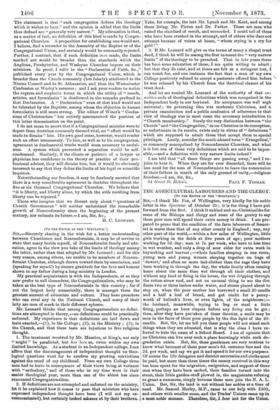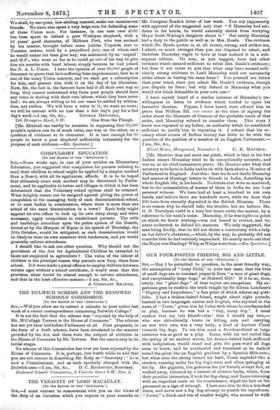THE AGRICULTURAL LABOURERS AND THE CLERGY.
[TO THE EDITOR OF THE "SPECTATOR.") SIR,—I thank Mr. Fox, of Wellington, very kindly for his noble- letter in the Spectator of October 25; it is the thing I have pat forward from the first. I think it unkind and un-Christianlike for- some of the Bishops and clergy and some of the gentry to say these poor men will spend their extra money in drink. I am pre- pared to prove that the condition of the farm labourers of Somer- set is worse than that of any other county in England ; nay, any other part of the world,—within a few miles of Wellington, little girls working in the fields at five years of age ; poor mothers working for 7d. day; men at 7s. per week, who have to lose time in wet weather, and only a drop of sour cider for extra work in, haymaking and harvest ; —whole families sleeping in one room, young men and young women sleeping together on bags of dowert,' and often no more bed-clothes than the rags they have- been working in through the day, the whole family often coming home about the same time wet through all their clothes, and without any food or firing in the house, the wet dripping through the rotten straw roof, and not an unusual thing to see the dirt floors two or three inches under water, and stones placed about to step on, when the poor mother has borrowed a small 20-candle and a half a loaf of bread, and got credit for a penny- worth of bullock's liver, or even lights, of the neighbours ;— the husband, meanwhile, trying to beg or steal a little firing, perhaps an hour elapses before any firing can be got ; then, after they have partaken of these dainties, a smile may be seen in the faces of these poor people by the dim light of the 20- candle. But, Sir, let me tell you these people will not stand such- things when they are educated, that is why the class I have re- ferred to hate the name of a School Board. I am of opinion that- no Christian can live near such a place knowingly while such de- gradation exists. But, Sir, these gentlemen are very anxious to know what becomes of these poor men's 6d. entrance fees and the 2d. per week, and say we get it and spend it for our own purposes Of course the 130 delegates and district secretaries and clerks must. be paid, but more than three times the money received in this way has been spent for the migration, emigration, and support of these men when they have been sacked, their families turned into the- street, their little garden-staff plowed in, the magistrates refusing to grant a summons, simply because these men join the N. A. L. Union. But, Sir, the land is not without her nobles at a time of- need. Mr. Samuel Morley, M.P., came to our help with 2500, and others with smaller sums, and the Trades' Unions came up in a most noble manner. _ThereforerZirrl_fear not for the Union.
Weahall, by our quiet, law-abiding manner, make our enemies our friendsi We have also spent a very large sum for defending some of these Union men. For instance, in one case over .£100 has been spent to defend a poor Wesleyan shepherd, with a 22 years' good character, of Milborn Port, who was accused by hie master, brought before some jealous Unpaids, sent to Taunton assizes, tried by a prejudiced jury, one of whom said he would rather rot than give way, was sentenced, by an ' unpaid ' and M.P., who went as far an he could go out of his way to give him six months with hard labour, simply because he had joined the N. A. L. Union. I have the opinion of over 30,000 people of Somerset to prove that he is suffering false imprisonment, that he is -one of the many Union martyrs, and we shall get a subscription for him, and present him with it on the day of his liberation. Now, Sir, the fact is, the farmers have had it all their own way so long, they cannot understand why these poor people should have any voice in dealing with their own labour, which they have never had ; we are always willing to let our cases be settled by arbitra- tion, not strikes. We will have a voice in it, we want no more; we will be content with no less than a fair day's pay for a fair day's work.—I am, Sir, &c., GEORGE MITCHELL,
[Mr. Mitchell can hardly be accurate in supposing that 30,000 people's opinion can be of much value, one way or the other, on a -question of evidence as to character. It is rare enough for 30 people to know a poor shepherd sufficiently intimately for the purpose of such evidence.—En. Spectator.]



































 Previous page
Previous page